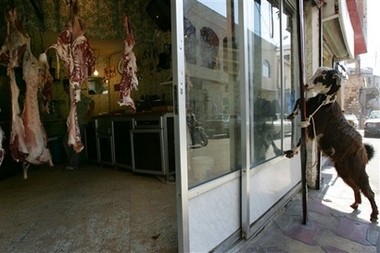"Three Papal Strategies to Revive Christianity" Last month, Pope Benedict XVI made a speech in his old university, Regensburg, in Germany. In this speech, he included a brief section in which he quoted an obscure 14th-century Byzantine emperor, who made a hostile analysis of Islam. This short section was very negatively received in the Islamic world and led to riots as well as multiple condemnations. The Pope has apologized, now four times, but only for causing so much consternation. He has stopped short of saying that the assessment of Islam was fundamentally wrong. Since this diplomatic flap, the world's analysts have been debating how someone so intelligent as the pope could have made such an "error." Perhaps it wasn't an error, but deliberate. Consider the nature of the Roman Catholic Church. It has existed for almost 2000 years. It is a church that believes that it encompasses the truth - both about God and about the necessary role of the Church in the pursuit of God's ends. It believes that its role is to evangelize the entire world and to arrive at a world in which all persons, without exception, are practicing Roman Catholics. Now consider its history as an institution. In the beginning, it was a church in expansion in terms of the number of adherents to the faith. It spread steadily, primarily throughout Europe and parts of the Middle East, for about a thousand years. Then it faced its first numerically significant schism in the eleventh century, that of the Eastern Orthodox churches. The Roman Catholic Church was as a result largely confined to western and central Europe. In the sixteenth century, the Church faced the Protestant Reformation, which led to the loss of most of northern Europe. And from the eighteenth century on, it began to lose practicing Catholics to what it saw as the cancer of secularism and free-thinking in Europe. In the post-1945 period, the number of practicing Catholics in the pan-European world dropped dramatically because of the spread of secular values. Not only were Catholics not attending mass in countries the majority of whose populations were nominally Catholic - Italy, Spain, France, Belgium, Austria, Ireland, Quebec - but vocations to the priesthood also dropped dramatically. This was true to a lesser extent in largely Catholic Latin America, where however the Church began to lose some ground to evangelical Protestantism. In general, however, in the global South, Church membership was still expanding, because of the combination of higher birth rates there than in Europe and the lesser appeal of secularism. Hence, the Church was no longer primarily European; it was coming to have more members in the global South. The Church's problem has not been that it was losing ground to other religions. Catholics were not converting to Islam, Judaism, or Buddhism. Nor were Muslims, Jews, and Buddhists converting to Catholicism. The Church's organizational problems were largely within the Christian world. The question for the church since 1945 has been how to react to this sudden and massive organizational shift. There have been three different Papal strategies to reinvigorate the position of the Catholic Church - those of John XXIII, John Paul II, and Benedict XVI. John XXIII called for an aggiornamento of the Church, that is a "bringing the Church up to date." The ecumenical council he convened, Vatican II, made many changes in the practice of the Church: a more flexible view about salvation outside the Church, a liturgy that was less Latin-based, a greater role for the bishops collegially. These changes seemed primarily aimed at meeting the implicit and explicit critiques of Catholics in the European world, who wanted the Church to be less out of tune with contemporary Western values. Vatican II was coincident in time with the rise of so-called liberation theology within the Church, particularly in Latin America. Its objective seemed to be to counter the view that the Church had been partisan to ultra-conservative political views. There was much criticism from within the Church that these reforms had "gone too far." John Paul II re-emphasized traditional Catholic values of sexuality, the role of women in the Church, and the subordination of the bishops to the pope. He attacked liberation theology, and replaced reformist bishops in the pan-European world with more traditionalist ones. His strategy for renewal seemed to focus on the potential for the Church in the global South. For this reason, he placed unusual emphasis on entering into dialogue with other religions. One result would be, he seemed to think, that there would be more access for the Church in non-European regions. Benedict XVI clearly has a third vision. He agrees with John Paul II on reining in the aggiornamento. But he disagrees that the future of the Church depends on inter-religious dialogue. His strategy focuses on recapturing the traditional base of the Church - its European roots. The speech he gave in Regensburg is essentially an attack on European secularism, and an urgent plea for the revival of a full-throated Catholic doctrine and practice in Europe. This fits in with his previous criticism of the possible entry of Turkey into the European Union, and his failed insistence that the proposed constitution of the European Union include an explicit reference to the central role of Christianity in Europe. In such a perspective, the use of the anti-Islamic statement of a Byzantine emperor fits in perfectly. It can be seen as a mode of consolidating Europe against an enemy, and thereby encouraging all Europeans to emphasize their Christian roots. He seemed to have been willing to risk Islamic anger in order to consolidate a European base. Three strategies - aggiornamento, outreach to the global South abetted by ecumenicism, and consolidating a European base on traditional Catholic bases. Which, if any, will be fruitful in the century to come? by Immanuel Wallerstein [Copyright by Immanuel Wallerstein, distributed by Agence Global. For rights and permissions, including translations and posting to non-commercial sites, and contact: rights@agenceglobal.com, 1.336.686.9002 or 1.336.286.6606. Permission is granted to download, forward electronically, or e-mail to others, provided the essay remains intact and the copyright note is displayed. To contact author, write: immanuel.wallerstein@yale.edu. These commentaries, published twice monthly, are intended to be reflections on the contemporary world scene, as seen from the perspective not of the immediate headlines but of the long term.] |

 Amongst those hit were 17 year old Hassan Soueid who died of his wounds. 14 year-old Mohammad Hussein Naji, Ali Al-Ouzyer aged 7, and 11 year old Khadar Ammar. According to Ahmad Talal the head of administration at Rasoul al-Azmaa Hospital they are seriously wounded and it isn't clear if they'll survive. The ISF say that the explosive bullets that killed and wounded aren't used by them. It's news to me that the ISF don't use explosive bullets.
Amongst those hit were 17 year old Hassan Soueid who died of his wounds. 14 year-old Mohammad Hussein Naji, Ali Al-Ouzyer aged 7, and 11 year old Khadar Ammar. According to Ahmad Talal the head of administration at Rasoul al-Azmaa Hospital they are seriously wounded and it isn't clear if they'll survive. The ISF say that the explosive bullets that killed and wounded aren't used by them. It's news to me that the ISF don't use explosive bullets.

 Most of our readers don't know Lebanon so I'll interpret. Kfar Kila is a border village in Southern Lebanon. Looking at the background to the photograph I would say that the photograph was taken at the approach to the "Fatima" gate. (You can tell from the uniforms that the two soldiers are Lebanese.) It's the poster that's interesting. Who is caricatured is plain enough. Or is it?
Most of our readers don't know Lebanon so I'll interpret. Kfar Kila is a border village in Southern Lebanon. Looking at the background to the photograph I would say that the photograph was taken at the approach to the "Fatima" gate. (You can tell from the uniforms that the two soldiers are Lebanese.) It's the poster that's interesting. Who is caricatured is plain enough. Or is it?


